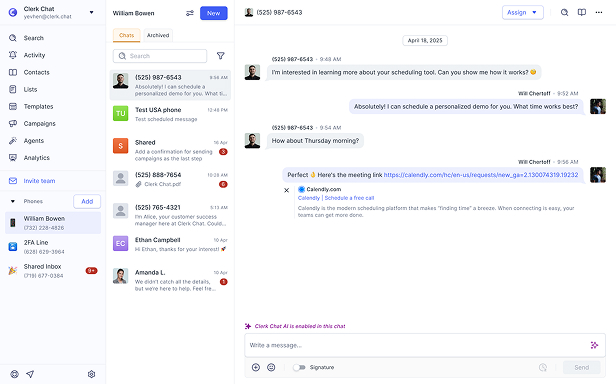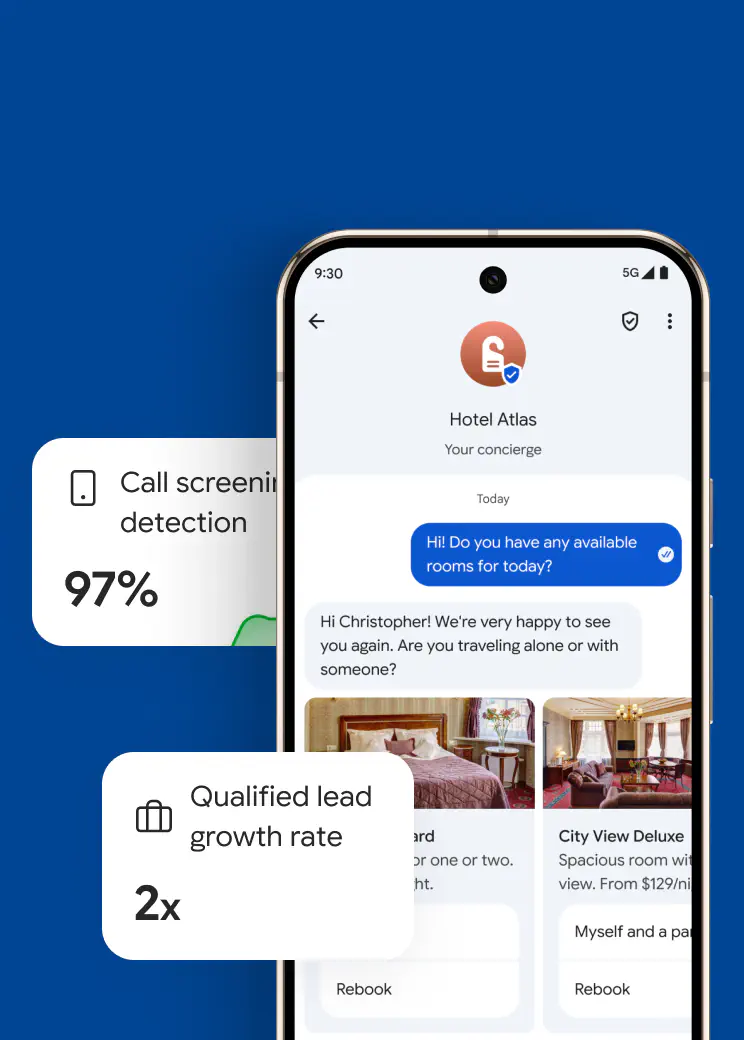See How AI Call Centers are Changing Customer Experience
By William Bowen
- Published: July 10, 2025
Key points in this article:
- AI call centers are revolutionizing customer service with intelligent tools for routing, self-service, quality control, agent support, and data analysis.
- Machine learning, voice recognition, and NLP capabilities are making AI systems more intuitive and effective for customer service teams, introducing new growth opportunities.
- Businesses of all sizes are using AI call center technology to streamline omnichannel support, reduce waiting times, cut costs, and personalize customer experiences.
- Used correctly, call center AI solutions can improve customer satisfaction and retention rates, reduce operational costs, improve business insights, and enhance scalability.
- To effectively leverage AI, call center leaders need to set clear objectives, navigate compliance and security risks, train teams, prioritize integrations, and constantly monitor performance.
- AI tools won’t replace human agents, but they will help human employees focus more of their attention on strategic, complex, and emotionally driven interactions.
- In the future, AI tools will evolve with new generative AI capabilities, seamless omnichannel integration, agentic AI workflows, and predictive analytics.
If you’re not experimenting with AI in customer service yet, you’re in the minority. The AI call center isn’t just driving the future of customer experiences. Intelligent tools are reshaping the landscape, making teams more efficient, improving satisfaction rates, increasing sales, and ensuring businesses can grow faster with intuitive data.
It’s no surprise that call centers have long prioritized quick innovation. After all, companies need to be creative to keep up with evolving customer expectations. Artificial intelligence, from conversational AI bots to generative AI apps and now agentic AI tools, is giving call centers the resources they need to adapt faster than ever before.
This is no passing trend. McKinsey has found that most companies already use AI in some form, and many rely on this tech for customer service.
Intelligent tools will continue to grow more sophisticated (and valuable) going forward, unlocking endless new opportunities for customer service teams. Now’s the time to ensure you’re ready for the call center AI software revolution.
In this article:
The Rise of AI Call Centers
It’s easy to look at AI for contact centers (and call centers) as a new and novel concept - probably because new types of AI tools keep emerging all the time. But artificial intelligence has been shaping customer service for a while now.
It started by revolutionizing how companies dove into data about customer experiences and made intelligent decisions to increase sales and retention rates. Since then, call center artificial intelligence has powered the shift to:
- Intelligent Routing: No more manual switchboards, AI can now analyze a customer’s inquiry, and immediately route them to the right department or agent.
- Intuitive Self-Service: From simple chatbots to conversational AI tools for customer service, AI is driving a new era of independent problem-solving.
- In-depth analytics: Today’s AI tools are tracking everything from customer satisfaction scores (through sentiment analysis), to agent performance metrics, call quality, and even conversion rates.
AI isn’t just affecting traditional “call centers” either - it’s having an impact on every service channel, from web-chat and email-based support, to customer service delivered through SMS, MMS, and even RCS.
Keep customers happy 24/7, understand what your customers really need, and scale your support smoothly.
AI for Call Centers: The Core Technologies Driving Innovation
The rise of AI call centers isn’t powered by a single technology - various transformative solutions are working together to shape the new era of customer service. These technologies are still evolving, but probably the most crucial components behind AI for customer experience are:
Conversational AI and NLP
Conversational AI is the technology that allows machines and humans to actually interact. Read our guide to conversational AI vs chatbots for more insights - but ultimately, what you need to know is that this tech allows bots to understand, and respond to humans.
With Natural Language Processing (NLP), language models, and advanced algorithms, AI systems can grasp the context and intent behind human queries. In other words, they don’t just recognize specific words and match them to pre-determined outputs. They listen to and reason through customer queries.
Conversational AI tools can also allow bots to analyze the sentiment behind customer statements. They can recognize what a customer is feeling based on the tone or cadence of their words, and adapt dynamically in response.
Machine Learning Algorithms
Machine learning algorithms (as well as more advanced solutions like deep-learning systems) allow AI systems to improve without regular retraining. These algorithms ensure bots can collect and learn from data from previous conversations, using those insights to improve their performance.
Machine learning can also help bots “predict” future needs. Call center AI solutions can analyze past interactions to anticipate future customer needs or buyer trends. This is extremely valuable for companies that need to stay one step ahead of resource allocation and strategic decision-making.
Some systems can even use machine learning to improve customer experiences in real time, analyzing historical data to give agents tips on how to improve customer satisfaction levels or adjust their tone based on customer sentiment.
Voice Recognition and Analysis
Voice recognition or “speech recognition” technology is often lumped in with conversational AI. It allows AI in call centers to understand spoken language for a more “natural” interactive experience.
AI solutions usually rely on speech-to-text systems to convert spoken language into written data that they can analyze. Voice recognition solutions don’t just help people interact with AI tools; they also enable the automation of various contact center processes.
For instance, when an IVR system understands a customer’s words, like “I have a billing question,” it can automatically route that customer to a department. This can improve customer response times and reduce call queues.
Key Applications of Call Center AI Solutions
As mentioned above, we’ve come a long way from AI call center solutions being used exclusively for self-service experiences. AI call center solutions handle everything from routing tasks to real-time and historical data analysis. There are even tools working as copilots - guiding agents through day-to-day tasks.
Here’s a brief look at some of the main applications for AI in call centers.
AI IVR and Routing Solutions
Let’s start with the most obvious use case for AI in the call center - self-service. First, AI systems have revolutionized the traditional “IVR” (Interactive Voice Response) system. Today, customers don’t need to press buttons on a keypad to navigate through a menu of strict options, and eventually reach the wrong department.
They can tell an AI-powered system exactly what they need, and it can use speech analytics and NLP to deliver a solution. That could mean simply answering a customer’s question directly, suggesting a solution (like asking the customer to contact an SMS customer service team), or directly routing the customer to the right agent.
If the system needs to route the customer to someone, it can use AI again to match the customer to someone with the right skills, knowledge, or availability to address their needs. Some systems can even automatically initiate callback requests.
Many more advanced AI call center IVR systems can even use self-learning algorithms to analyze customer call histories, personality models, and behavioral data to more effectively determine the best way to handle calls. For instance, they might send simple support requests to a conversational AI bot or notify a supervisor about a complex issue.
Voice Assistants and Chatbots
Speaking of self-service solutions, AI in contact centers gives organizations countless ways to streamline and automate customer service tasks. An IVR bot can also act as a voice assistant, answering customer queries and completing tasks like a chatbot. Some solutions can even process payments or access business data to provide insights into orders or account balances.
The same tools can direct customers to other AI bots or intelligent self-help resources, like knowledgebase articles and videos. The rise of agentic AI solutions is even driving the development of multifunctional bots that can guide customers through multiple stages in a service journey.
For instance, a customer could start a conversation with a smart voice assistant, which then follows up by sending them helpful resources through an AI-powered texting solution. Then, if the customer needs further support, they can respond to the bot and ask for a callback from a human agent.


AI Call Center Quality Control
Want to improve the quality of every interaction you have with your customers? Call center artificial intelligence can help. AI systems with NLP capabilities can listen to calls in real time, identifying connection problems, dropped calls, and even agent performance issues.
They can listen to the words spoken in real time, assess customer and agent sentiment, and even determine when to notify a supervisor about an issue. For instance, if a customer shows signs of dissatisfaction or a keyword flags a compliance concern, an AI tool can instantly inform a manager who can jump in and take control of the call.
After conversations, AI systems can generate and analyze call transcripts, looking for repeat problems or areas ripe for improvement. These tools can also assess transcripts at scale to identify common problems, trends, or customer preferences. Some AI call center solutions even create automatic performance scorecards and dashboards for agents and provide them with real-time feedback on how to improve their performance.
Using AI Tools for Data-Driven Growth
Aside from transforming self-service, one of the biggest use cases for AI in contact centers revolves around data analysis. With AI, call centers can transform data into actionable intelligence. AI tools can correlate data from previous calls and transcriptions, mass texting systems, and chat logs, to help companies learn more about the customer journey.
The same tools can also track customer service analytics, consistent skill gaps among team members, and behavioral patterns, to identify emerging issues or opportunities. There are even handy AI call center solutions that can use collected data to predict CSAT and NPS scores without relying entirely on customer surveys and feedback.
The more data call center AI software collects, the more it can help businesses make better decisions. The insights you get can help you determine which channels you should be using for service - like whether you should consider an SMS call center solution.
They can show you when you’re likely to see an increasing number of service requests, based on historical data, so you know how to optimize staffing levels. They can even help you segment and analyze your audience more effectively, so you can build more personalized sales, marketing, and customer support strategies.
Using AI in Contact Centers to Boost Agent Efficiency
AI in call centers doesn’t just improve customer experiences, or help supervisors and managers access better insights. It also has a direct impact on agent performance. With conversational AI in customer service, agents can automate various tasks.
An AI assistant or copilot can instantly surface information from a knowledge base or CRM system for an agent to use based on keywords spoken in a call - reducing the time they spend searching for knowledge.
These tools can also reduce call wrap-up times, by automatically creating summaries and transcriptions that can be uploaded straight to help desk software or CRM platforms. Plus, AI assistants can support agents throughout the customer service process.
Copilot-style agents can actively listen to interactions and suggest relevant responses or troubleshooting tips to agents as they work. They can draw on CRM data and other insights to help agents deliver more personalization in customer service, by highlighting a customer’s previous purchases or what happened in previous calls. Some tools can even coach agents through difficult conversations, providing support or motivation.
Examples of AI in Contact Centers
It’s becoming increasingly rare to find a contact center or call center that doesn’t use some sort of artificial intelligence. AI call center solutions are becoming increasingly affordable and accessible to even smaller companies. Plus, many businesses are recognizing that they need to either adopt these tools, or risk falling behind.
Here are a few examples of companies successfully embracing AI in call centers:
- Klarna: Leading payments company Klarna introduced a generative AI agent into its contact center system, which works across multiple channels. The agent can handle customer inquiries in 35 languages and has reduced the team’s average response time from 11 minutes to 2 minutes, handling about 75% of interactions.
- Nova Auto Pros: Automotive company, Nova Auto Pros, uses AI in its business messaging strategies to improve call center and sales operations. Its Clerk Chat AI agent qualifies leads, answers FAQs, and hands off to a human sales rep.
- CNH Care: Healthcare innovator CNH Care uses AI in the call center to automate routing, deliver proactive support, and reduce waiting times. The system also monitors dropped calls and ensures near-immediate call-backs, which has helped the company build and maintain a 96% CSAT score.
- Custom Ink: Using an omnichannel AI solution, Custom Ink has streamlined call scoring and improved its coaching strategy. It ensures agents get access to real-time assistance to enhance conversational customer engagement. The company says its AI tools have boosted efficiency by 20%.
- Wyze Labs: A smart home tech company, Wyze Labs uses a unified omnichannel contact center with integrated AI tools to personalize text messages and outreach strategies, streamline customer service requests, and increase sales. Since then, the company has reported a 78% increase in call acceptance rates for sales teams.
The Benefits of AI Call Centers
AI is having a transformative impact on virtually every team across countless businesses. It enhances text message marketing for small business leaders, improves sales strategies, and boosts team efficiency. The AI call center revolution helps companies:
- Increase Productivity: Call center AI software boosts productivity by automating routine tasks, from call transcription to data handling and basic customer service operations. That means team members have more time to focus on valuable tasks that require human expertise and creativity.
- Improve Customer Satisfaction: AI call centers empower companies to deliver fast, efficient, personalized customer service. Some AI tools can even integrate with Microsoft Teams, SMS, email, and social media systems to offer omnichannel support, and many can understand various languages, enabling global reach.
- Reduce Costs: AI call centers also minimize operational costs by reducing the work human agents need to do with automation, and streamlining onboarding and training initiatives for new staff.
- Enhance Insights: By collecting and analyzing data from multiple channels, AI tools help businesses make better decisions about which support channels to offer, how to distribute resources, and even how to personalize customer experiences.
- Boost Scalability: AI solutions can help support teams scale faster by ensuring that customers have more intuitive ways to resolve their problems independently and ensuring that resources can be distributed across channels in a range of languages.
Ultimately, AI for contact centers makes it easier for any business to deliver exceptional, personalized customer service while minimizing costs - it’s a win-win for everyone.
Keep customers happy 24/7, understand what your customers really need, and scale your support smoothly.
Implementing AI in Call Centers: Navigating Challenges
By this point, it’s probably obvious that AI is the future for call centers. However, while AI is becoming more accessible, sophisticated, and easier to adopt, there are still challenges. You still need to make sure you’re adhering to voice and SMS regulations when you’re using AI bots, and following data privacy and security standards.
Plus, you’ll need to ensure your AI bots work with the tools you already use to deliver customer support. Here are our top tips for success:
1. Define Clear Goals and Objectives
Don’t just embrace AI call center solutions to “keep up with the competition”. Be specific about the goals you want to achieve or the problems you want to overcome. For instance, are you trying to speed up customer response times, reduce call queues, enhance self-service strategies, or boost agent efficiency?
Setting clear goals in advance ensures you’ll know what features you should look for in your call center AI software. Plus, it will help you identify the metrics you should track to determine whether your investment is paying off.
2. Determine Your Compliance Strategy
Whenever you embrace a new technology to interact with customers, there are compliance standards to keep in mind. For instance, when you use SMS for retail or marketing, you need to adhere to TCPA standards.
Similarly, when you embrace AI for call centers, you’ll need to adhere to strict data privacy and security guidelines. Safeguard the customer data handled by AI systems, and make sure your customers know what kind of data you’re collecting and handling. If you need to keep records of customer conversations, make sure you do so carefully, with an intuitive archiving solution.
3. Prioritize Integrations
Integrations are crucial for AI in contact centers. First, you’ll need to ensure your AI systems integrate with your call center infrastructure and software. They should also integrate with data-focused platforms, like your CRM system (such as Salesforce), or your customer data platform. If you’re using AI as part of an omnichannel customer service strategy, make sure your system works seamlessly with all the channels you use.
For example, you might need to look for an integration between your bot platform and your SMS marketing solution for ecommerce, your email platform, and social media tools.
4. Provide Comprehensive Agent Training and Support
Call center artificial intelligence shouldn’t replace humans - it should augment their performance. Make sure your teams can make the most of your software, with comprehensive training. Don’t just provide them with a simple guide on “what is conversational AI” and call it a day.
Use videos, workshops, and even mentorship programs to ensure every team member knows how to use the system effectively, and safely. Update your training resources regularly as you experiment with new models, channels, and strategies.
5. Monitor and Fine-Tune AI Performance
Implementing an AI call center shouldn’t be a set-and-forget process. Once you’ve infused AI into your processes, monitor its performance. Pay attention to customer satisfaction rates, and how they change - employee performance metrics, and overall call center efficiency.
Collect feedback from both your employees and customers, and use those insights to fine-tune and improve your models over time. Additionally, remember to constantly update your models with new data and insights about your customer base.
The Role of Call Center Agents in the Age of AI
At this point, you might be thinking that AI for call centers sounds great - but what does it mean for the future of contact center agents. Will human beings become obsolete in an age where AI can do everything from send mass texts from a computer, to troubleshoot purchasing issues, and complete transactions?
The simple answer is “no”. While it’s true that AI will potentially take over a lot of the work agents do in modern contact centers - particularly in the age of agentic AI - this won’t eliminate the need for human employees. Instead, it simply means that agent roles are going to change.
Instead of spending all of their time fielding repetitive requests, entering data into CRMs, transcribing conversations, and making cold calls, agents will focus on more creative, emotional, and complex work.
Human beings will still be who customers turn to when they’re having trouble with an issue that AI simply can’t solve, or when they’re looking for emotional intelligence.
After all, while AI is becoming increasingly effective at understanding emotion and sentiment, it still can’t fully comprehend all the nuances of customer conversations. Most bots still struggle with sarcasm, humor, and cultural references, for instance.
If companies want to maintain strong relationships with their audience, they can’t invest in a “full” AI call center. They’ll need to find the right balance - using AI to automate simple tasks, while still leveraging human beings for emotionally nuanced discussions.
The Future Landscape: Emerging Trends
So, what’s next for the AI call center? A lot of ongoing growth. According to Markets and Markets, AI in the call center is growing at a rate of 21.3% CAGR. In the last couple of years, we’ve seen the rise of numerous trends. Generative AI is becoming more deeply embedded into chatbots and AI assistant tools. “Copilot” style solutions help agents resolve customer issues faster, reducing waiting times. Some are even helping with conversational messaging and personalized outreach strategies.
Speaking of personalization, AI tools are becoming increasingly effective at helping businesses gather the insights they need to deliver tailored experiences at scale. Advancements in AI speech analytics software and sentiment analysis tools help companies learn more about the needs and preferences of their target audience. Some solutions even help companies predict customer needs and opportunities in advance, helping them take a more proactive approach to sales and customer service.
Additionally, AI tools are becoming more effective at automating and enhancing various call center processes. Agentic AI is paving the way for a future where AI bots can set goals and handle multi-stage tasks autonomously, with minimal human input. This means future voice agents could do everything from screening leads to prequalifying customers, handling initial outreach, and processing transactions.
Additionally, as the demand for omnichannel customer service grows, AI solutions will be embedded into more channels across the contact center. We’ll see more advanced chatbots, voice agents, and multimodal systems that can interact with customers on any channel, from SMS to video conferencing platforms.
If you want to learn more about the latest innovations in conversational, generative, and agentic AI for contact center and customer service leaders, explore more of our blog posts.
The New Era for Intelligent Call Centers
The rise of AI call centers isn’t just another overhyped trend in an ever-changing customer experience landscape. AI is fundamentally reshaping how companies serve, support, and retain customers. While this technology won’t replace the need for human agents, it will transform how customer service teams work and alter their roles going forward.
The good news for companies (and customers) is that AI’s impact on contact centers is mostly positive. If your business takes the right approach to implementing AI effectively, safely, and ethically, it can deliver better service, cut costs, and improve efficiency.
Want to learn more about the growing potential of AI in customer service? See how other companies use Clerk Chat to optimize their support with conversational agents.
Will’s latest superpower is building innovative AI solutions to add value for clients. He's passionate about all things AI, entrepreneurship, and enjoys staying active with sports and outdoor activities.
In this article:
- The Rise of AI Call Centers
- AI for Call Centers: The Core Technologies Driving Innovation
- Key Applications of Call Center AI Solutions
- Examples of AI in Contact Centers
- The Benefits of AI Call Centers
- Implementing AI in Call Centers: Navigating Challenges
- The Role of Call Center Agents in the Age of AI
- The Future Landscape: Emerging Trends
- The New Era for Intelligent Call Centers
Ready to use your business number for text messaging?
Thousands of businesses are already experiencing the power of conversational messaging through SMS. Join us. Free trial and paid tiers available.
Get Started#Subscribe
Get product updates in your inbox
Tutorials, features, and Clerk Chat news delivered straight to you.



